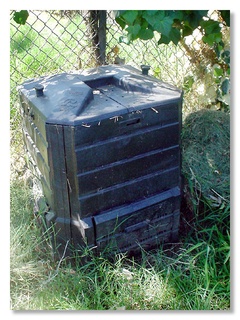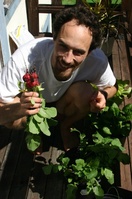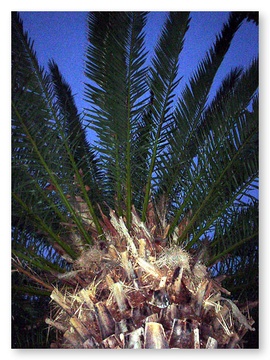We have many opportunities to garden in Davis. There are two community gardens, both of which are open to the general public. The Experimental College manages a beautiful community garden on campus, known as the the EC Garden; this large garden covers a few acres of land, has a California native plants area, and even a communal orchard. The City of Davis also manages a pleasant community garden located on 5th Street. Both of these community gardens have been around since the '70s and are great places to learn about gardening, meet some good people, and grow some tasty organic fruits and veggies.
If you have gardening questions, there's now a place to ask them — Garden Questions!
Davis Conditions
 Davis is generally cursed with clay soil.
Davis is generally cursed with clay soil.  Composting needn't be stinky, messy, or occupy much space. The addition of composted materials will greatly improve Davis soil and plant performance.
Composting needn't be stinky, messy, or occupy much space. The addition of composted materials will greatly improve Davis soil and plant performance.
Davis soils vary from moderately sandy in south and east Davis, through loamy soils in central Davis, to heavy clay soils in west and north Davis. The heavy textured (clay) soils contain abundant shrinking and swelling minerals. Although this type of soil may appear to be difficult to work with, the high water holding capacity and nutrient supply make for an excellent growth medium. However, the rather hard dry consistency of these soils can severely hinder seed germination or initial root growth. Incorporation of organic material such as yard clippings or potting soil into these soils can greatly improve germination success.
Because of our soil type, you'll most likely need to amend your soil with humus and/or manure, creating "holes" to improve drainage and help your plants grow — bark, leaves, twigs, and compost are much bigger than clay/sand. Peat moss is too fine to improve drainage of clay soils. If you've got a yard, collect your leaves and lawn cuttings to create leaf mold or start a compost pile; the On Campus Co-ops have a compost demonstration that can help you get started. Soak your soil a few days before turning it over with compost, and let it dry just to a workable consistency so it's not soaking, but it's not like rock either. If you amend your planting beds annually with a couple inches of compost or manure (depending on your plants' needs), you should be able to develop some pretty healthy soil conditions for most plants. If you don't plant during the winter months and don't plant green fertilizers, lay down a thick layer of mulch (this can even be shredded newspaper!) to keep down weeds and encourage worms — in spring, simply turn this into your planting area.
And though we're blessed with a long growing season and mild winters, most plants grown in town will need to either be drought tolerant, able to withstand intense summer heat, or helped along by some shade and regular watering. Take a look at our Weather page to get an idea of Davis rainfall, when our seasons begin/end, and what the temperatures are at various times of the year. Davis is also in Sunset Zone 14, which reflects the effect of our locally famous southwest delta breeze that somewhat mitigates those summer highs, or at least lets us cool down a bit earlier in the day than Woodland. Davis' winds typically come from either the southwest delta or north, with the latter arriving around March and October; as these northerly winds sweep down the valley, their speed increases significantly by the time they reach Davis, as allergy sufferers and Yolo Causeway commuters can attest. As far as gardening is concerned, it would be wise to avoid shallow-rooted or brittle trees and provide some protection for wind-sensitive plants.
Now that you're up to speed on our local climate, our Culinary Plants page includes a planting calendar to help you get your vegetable garden started. As far as the landscape, California natives are a perfect choice for our climate and will be your lowest maintenance option. Subtropicals would probably be your next best bet, requiring only regular watering. If you choose to venture further afield into shade plants or exotics, be prepared to arrange to have somebody water your plants when you decide to leave town or risk spending a lot of money on cool plants that may not survive.
If your garden is successful, you'll probably be able to give surplus away to friends. But if you're having trouble, consider the Surplus produce page, to contact hungry computer users.
Garden Pests
 This poor rose is afflicted with both aphids and rust! Luckily Davis roses usually outgrow these two problems quickly; aphid-eaters quickly follow the aphids, and rust disappears as we get drier.
This poor rose is afflicted with both aphids and rust! Luckily Davis roses usually outgrow these two problems quickly; aphid-eaters quickly follow the aphids, and rust disappears as we get drier.
Pest Management
visit UC Integrated Pest Management
- Beer [see Slugs & Snails]
- Cigarette Butt Juice [see Aphids]
- Ladybugs
- Marigolds
- Praying Mantis'
Apartment Gardening
 Canned tomato. Remember to recycle the can when you're done with it. Stuck without a garden plot to call your own? Get creative and bring the outdoors in! You could easily just buy a flower pot, but you might also use containers that you already have around the house (around the apartment, that is). If you start small, like with this tomato-plant-in-a-can, you will need to move it to progressively larger containers as it grows. Next step, milk jug. Then, an old recycling bin (thanks for the tip Tim). You can also cut the top off a 3 liter soda bottle for plants that don't require larger containers. Always remember to poke holes in the bottom to drain excess water though, or else the roots will rot and the plant will die.
Canned tomato. Remember to recycle the can when you're done with it. Stuck without a garden plot to call your own? Get creative and bring the outdoors in! You could easily just buy a flower pot, but you might also use containers that you already have around the house (around the apartment, that is). If you start small, like with this tomato-plant-in-a-can, you will need to move it to progressively larger containers as it grows. Next step, milk jug. Then, an old recycling bin (thanks for the tip Tim). You can also cut the top off a 3 liter soda bottle for plants that don't require larger containers. Always remember to poke holes in the bottom to drain excess water though, or else the roots will rot and the plant will die.
With an apartment garden you actually reap several benefits over an outdoor garden. For one, you can move your plants around to follow the sunlight. Even more important, you're no longer bound by mother nature's bothersome changing of the seasons. What's more, having plants indoors adds oxygen and humidity to the air. All this is not to mention the cancer-fighting qualities of tomatoes. You simply can't go wrong with an apartment garden!
Note: the nutritional information on the can does not apply to the tomato plant.
 Radishes from the balcony garden. We've become apartment garden happy in the last month. We've got two recycling bins (not new ones) many pots, and a wooden long box which serves as our lettuce row. We've even planted collards, turnips, radishes (we love radishes!) and squash in a 1 foot strip between the concrete of the driveway and the wall of the house. The bloody things are surviving despite slugs, sow bugs, and countless years of motor oil, car wash suds and paint chips poisoning the soil! Tasty too!
Radishes from the balcony garden. We've become apartment garden happy in the last month. We've got two recycling bins (not new ones) many pots, and a wooden long box which serves as our lettuce row. We've even planted collards, turnips, radishes (we love radishes!) and squash in a 1 foot strip between the concrete of the driveway and the wall of the house. The bloody things are surviving despite slugs, sow bugs, and countless years of motor oil, car wash suds and paint chips poisoning the soil! Tasty too!
Anyone have tips for apartment gardening?
Notable Gardens in Davis
- Experimental College Community Garden
- Davis Community Garden
- Co-op Community Garden
- L and 2nd Garden
- Solano Park Gardens
Resources, Info & Plant Sources
- ACE Hardware has a gardening section with a good plant selection
- The UC Davis Arboretum can help you plan your garden with its guided tours and plant tags and has very popular, plant sales open to the public in the fall and spring (including many native plants).
- Culinary Plants provides a listing of edibles including fruit trees
- Farmer Fred is the host of the "KFBK Garden Show" (1530 AM) & "Get Growing" (650 AM) Sunday mornings at 8:30am and 10am
- Friends of the Arboretum holds quarterly plant sales; many unique California natives can be had for a pretty penny
-
Longs DrugsCVS and Rite Aid also offer a small selection of plants and garden items; plants are drastically reduced just before the stores kill them off and can often be revived. (There are no plant experts there to ask questions of, so it's helpful to look in a Western Garden book to see what will actually grow here.) - The UC Cooperative Extension Master Gardener Program assesses community needs for home gardening education and develops programs to enhance home gardening experiences. They also off free gardening workshops to the community.
- Redwood Barn Nursery has knowledgeable staff, a diverse selection, and an informative website.
- Don Shor has a new gardening blog.
- Town Flora is a general listing of plants found growing in Davis
- Each year, and maybe twice a year, the Sac Bee publishes a chart describing which vegetables grow best in the various seasons. Similar charts are available online at: http://redwoodbarn.com/pdfindex.html .
- Vegetable Research & Information Center — VRIC provides information about vegetable gardening, among other vegetable related subjects. Part of the UC Davis Cooperative Extension.
- Edible Backyards is a local business that specializes in building raised garden beds with edible plants.
- Edible Landscaping has some interesting info on gardening.
- Read an article about a local gardener in a July 2010 post by Davis Life Magazine. This is one in a series called 'Digging Davis'.
- High Grade Harvest has knowledgeable staff and hard to find garden supplies
- Calscape.org Davis area native plants and plants that are obligate hosts of local butterflies and moths.
Gardening Events
- Davis' Green Home & Garden Show
- The Davis Garden Show is a call-in radio program (live Thurs. at Noon, re-airing Sat. 9:00am) on "KDRT" (95.7-FM), hosted by Don Shor and Lois Richter.




